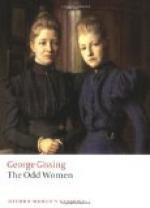So the quarrel was one of jealousy. But no sooner had it taken place when Mary Barfoot experienced a shame, a distress, which in truth signified the completion of self-conquest. She thought herself ashamed of being angry where anger was uncalled for; in reality, she chastised herself for the last revival of a conflict practically over and done with so many years ago. And on this very account, precisely because she was deceiving herself as to her state of mind, she prolonged the painful situation. She said to herself that Rhoda had behaved so wrongly that displeasure was justified, that to make up the quarrel at once would be unwise, for Miss Nunn needed a little discipline. This insistence upon the side issue helped her to disregard the main one, and when at length she offered Rhoda the kiss of reconcilement, that also signified something other than was professed. It meant a hope that Rhoda might know the happiness which to her friend had been denied.
Everard’s announcement of his passion for Miss Nunn seemed to Mary a well-calculated piece of boldness. If he seriously sought Rhoda for his wife, this frank avowal of the desire before a third person might remove some of the peculiar difficulties of the case. Whether willing or not to be wooed, Rhoda, in mere consistency with her pronounced opinions, must needs maintain a scornful silence on the subject of Everard’s love-making; by assailing this proud reserve, this dignity which perchance had begun to burden its supporter, Everard made possible, if not inevitable, a discussion of his suit between the two women. She who talks of her lover will be led to think of him.
Miss Barfoot knew not whether to hope for the marriage of this strange pair. She was distrustful of her cousin, found it hard to imagine him a loyal husband, and could not be sure whether Rhoda’s qualities were such as would ultimately retain or repel him. She inclined to think this wooing a mere caprice. But Rhoda gave ear to him, of that there could be little doubt; and since his inheritance of ample means the affair began to have a new aspect. That Everard persevered, though the world of women was now open to him—for, on a moderate computation, any man with Barfoot’s personal advantages, and armed with fifteen hundred a year, may choose among fifty possible maidens—seemed to argue that he was really in love. But what it would cost Rhoda to appear before her friends in the character of a bride! What a humbling of her glory!
Was she capable of the love which defies all humiliation? Or, loving ardently, would she renounce a desired happiness from dread of female smiles and whispers? Or would it be her sufficient satisfaction to reject a wealthy suitor, and thus pose more grandly than ever before the circle who saw in her an example of woman’s independence? Powerful was the incitement to curiosity in a situation which, however it ended, would afford such matter for emotional hypothesis.




